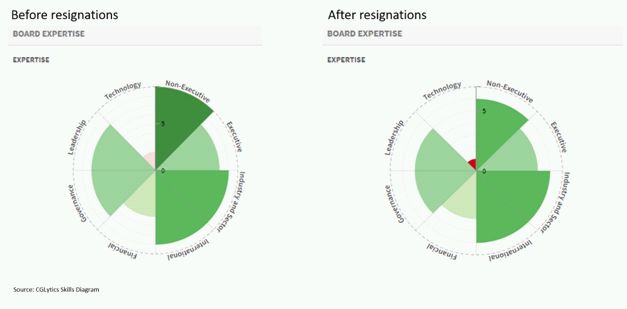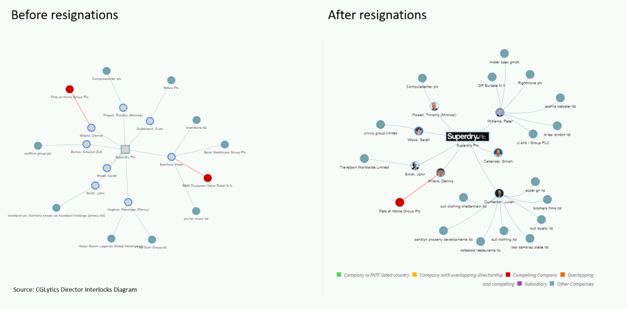Superdry was founded from a creative partnership between entrepreneurs Julian Dunkerton and James Holder in Cheltenham, UK in 2003. From an initial collection of five t-shirts, which included the iconic Osaka 6 worn by British superstar David Beckham, the company has grown to offer seasonal collections comprising thousands of items and over 500 distinctive logos. Currently, they represent a global community and have developed a cult celebrity following. It is currently a constituent of the FTSE 250, becoming one of the biggest fashion retail success stories in recent times.
In October 2014, the company announced the appointment of Euan Sutherland as their new CEO, replacing founder of the company Julian Dunkerton. Julian stayed on as a Brand Director of Superdry. At the time, the company said that as a business with huge growth opportunities, the need for an experienced CEO was paramount. Euan became the preferred choice as he knew the business well, having been a Non-Executive Director since 2012, and was instrumental in implementing and driving a five-year global strategy that delivered more of the incredible growth that Superdry has become renowned for. The company's financial success is well documented. From 2012 to 2019, the company's revenue grew from GBP 329M to GBP 886M while net income grew from GBP 31M to GBP 63M. For share price growth however, the company experienced a sharp dip from GBP 19.03 in 2017 to GBP 4.68 in 2018. (Year-end)
In March 2018, it was announced that Julian was to step down as a director from the Board. In January 2018, Mr. Dunkerton took advantage of Superdry's impressive stock market performance as shares rose to a five-year high in December and sold part of his stake, making almost GBP 18m. However, he remained the largest shareholder, with control of about 19% in the company. After his departure, the Board comprised of 9 members including 2 women forming about 22% of the Board composition. Just before the General Meeting, the Board comprised of 8 directors and proportion of women of the Board therefore increased to 25%.
In December 2018, Julian censured the business model of the company he cofounded and launched a campaign to return to the company. In an unusual intrusion, Dunkerton disapproved the firm's business model in comments to the Liberum analyst Wayne Brown, a former head of investor relations at Superdry. The retail entrepreneur stated in the note that he quit the company's board in March 2018 because he could not "put his name to the strategy". In another comment to the BBC, Dunkerton said that he's willing to return to the company "in any capacity" to turn the company around.
Following growing tension between Julian and the Board, the Board announced a general meeting for April 2, 2019 to decide whether the former should be reinstated to the Board. The Board unanimously asked Shareholders to vote against the return of Julian Dunkerton and against the appointment of Boohoo Chairman Peter Williams, which Julian was seeking to bring to the Board as a chairman to overthrow the current. The Board listed various reasons for their decision among which they stated that Mr. Dunkerton's return would have damaging business impacts because his views have not evolved with the needs of an increasingly international multi-channel brand business. The Board also added that his return will be divisive and distract from the delivery of the Global Digital Brand strategy. For Mr. Williams, the Board said that though he is being nominated as an Independent Director, they cannot trust the transparency of the action because it is not clear if he's being nominated to serve the interests of Mr. Dunkerton and James Holder; and (ii) is NOT INDEPENDENT and does not represent the interests of all shareholders equally. Again, his appointment will be in a manner that which circumvents good corporate governance and the established policies and procedures of the Company.
The outcome of the meeting was quite different from the Board's recommendation as shareholders voted to elect Julian to the Board by 51.15%. Peter Williams was also elected to the Board by 51.15%. This subsequently led to the resignation of then Chairman Peter Bamford, CEO Euan Sutherland, Chief Financial Officer Edward Barker and Independent Director Penelope Hughes. Subsequently, Peter Williams was appointed Chairman and Dunkerton, interim CEO. With the current composition of the Board, women form only 14% of the Board, a drop from the initial female composition of 25% before the disruptions. Dennis Millard, Minnow Powell, Sarah Wood and John Smith who are all Non-Executive Directors have also given three months' notice and will stand down as Directors on July 1, 2019.
The board expertise diagrams below, produced directly from data and analytics in CGLytics' platform, show Superdry's board expertise matrix before and after the mass resignations that happened after the April 2nd 2019 General Meeting. The information used for producing CGLytics' expertise and skills matrices in the SaaS offering is standardized and applied consistency to more than 5,500 companies globally for easy comparison, analysis and benchmarking of boards composition.

It is evident, from CGLytics' Board Expertise matrix, that the expertise of the board has reduced since the resignations of Directors. Before their General Meeting in April 2019, 25% of the Board had Technology expertise; with the current Board composition, approximately 14% of the Board has Technology expertise. With today's retail business climate, the connection and interaction between traditional stores and the internet is fundamental to the growth of businesses in this sector. With the company's struggling performance over the years, having directors with technology expertise could bring another dimension to the company's strategy with adapting to changing customer needs and preferences as the it solidify itself as a "global digital brand".
Another interesting insight is that after the resignations there is now no Executive board member who has financial expertise, however some of the non-Executive board members do including the new Chairman, Peter Williams. Previously Superdry's CFO had a seat on the board, which may have an impact on the financial decision-making.

In such turbulent times for a company it is especially important that members of the Board are focused and have sufficient time to perform their duties adequately. Directors that hold too many positions (overboarded) are seen to not be able to provide the best support and make the best possible decisions for a company, which should also be a concern for Superdry stakeholders.
Before the General Meeting of the company, approximately 75% of the Board served on 8 other listed companies' Boards in total, compared to 57% of the current Board members holding 6 other seats on listed Boards. Again, of these, the new Chairman of the Board, Peter Williams, serves on three other listed Boards including one other chairmanship position. Though he is not considered overboarded according to the UK corporate Governance code, there may be some reservations over his ability to discharge his duties given his other time commitments. The composition of the Board before the General Meeting also had directors who served on two other Boards; these includes the former chairman of the Board Peter Bamford and Penelope Hughes, who is also the current chair of Aston Martin Lagonda Global Holding Plc.
Lessons learnt and key takeaways from Superdry:
The Superdry development has shed light on how large shareholders influence voting outcomes. Specifically, Julian Dunkerton and his co-founder who owns about 28.1% between them could influence the resolution to change the direction of the company. According to the statement released by the company after the general meeting, 74% of shareholders other than Julian and James have voted against the resolutions. Two big institutional shareholders - Investec and Schroders, which together control about 10% of the shares also supported Mr. Dunkerton's return.
But the company's second largest shareholder, Aberdeen Asset Management, sided with Superdry management, and influential investor advisory firms PIRC and Institutional Shareholder Services (ISS) had both recommended that shareholders should reject Mr. Dunkerton's re-election. What cannot be ignored is that this development has set an unprecedented case in Corporate Governance.
Would you like to learn more about how, you too, can have instant insights into more than 5,500 globally listed companies' board composition, diversity, expertise and skills? Click here to find out about CGLytics' boardroom intelligence capabilities and obtain the same insights used by investors and advisors.
The content of this article is intended to provide a general guide to the subject matter. Specialist advice should be sought about your specific circumstances.

